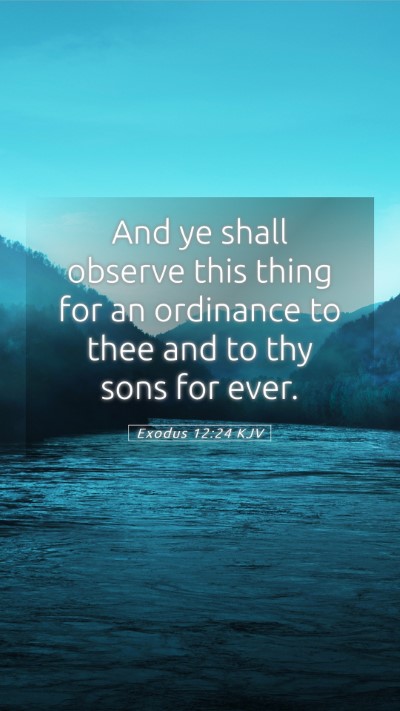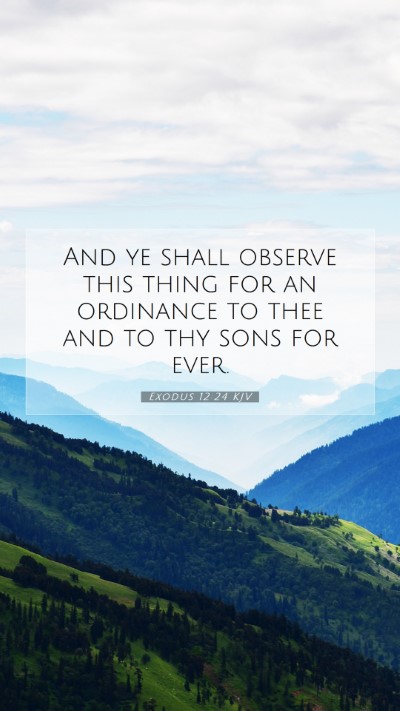Understanding Exodus 12:24
Exodus 12:24 states: "And you shall observe this thing as an ordinance for you and your sons forever." This verse is a critical commandment given to the Israelites concerning the observance of the Passover. To grasp its profound meaning, we can synthesize insights from various public domain commentaries, including those of Matthew Henry, Albert Barnes, and Adam Clarke.
Meaning of the Verse
The primary intention of this ordinance is to ensure that the significance of the Passover—the deliverance of the Israelites from slavery in Egypt—would be remembered by future generations. Each component of this verse contributes to a deeper understanding of its theological and historical implications.
Historical Context
Historical context is crucial when interpreting Scripture. This command is given in the lead-up to the Exodus, a pivotal event in Israelite history. Understanding this backdrop helps to illuminate why observing the Passover was essential not only as a memorial but as an act of faith and obedience.
Theological Insights
-
Divine Command: The use of the term "ordinance" signifies the permanence of this command. This shows God's desire for His people to regularly engage in acts of remembrance.
-
Generational Responsibility: The mention of "your sons" emphasizes the importance of teaching future generations, which aligns with Deuteronomy 6:7 where parents are instructed to instill the commandments in their children.
-
Spiritual Legacy: Observance of the Passover serves as a spiritual legacy, fostering an understanding of God’s faithfulness and power in delivering His people.
Commentary Highlights
Matthew Henry
Matthew Henry notes that this command underscores the duty to cultivate a continuous remembrance of God’s deliverance. He encourages believers to continually reflect on God’s past mercies as a means of strengthening faith.
Albert Barnes
Albert Barnes elaborates on the societal implications of the Passover observance, emphasizing that it was a community event that unified the Israelites in a shared experience of salvation. He notes that such communal remembrance fosters collective faith and identity.
Adam Clarke
Adam Clarke stresses the need for teaching the significance of the Passover to children. He interprets this command not merely as observance but as a call to educate about God's redemptive acts in history, highlighting the relational aspect of faith.
Application of the Verse
This verse extends beyond a historical context; it serves as a model for how modern believers can engage in remembrance. Daily acts of worship, family discussions about faith, and participation in communal rituals can be seen as parallel to the Passover observance. The significance of remembering God's past actions is vital for spiritual growth and community cohesion.
Related Bible Cross References
- Deuteronomy 6:7: Highlights the importance of teaching God's commandments to children.
- Exodus 13:8: Pertains to teaching children about the significance of the Passover.
- Psalm 78:4: Encourages storytelling about God’s deeds to the next generation.
Conclusion
Exodus 12:24 encapsulates the essence of remembrance in the faith journey of the Israelites, urging believers to not let divine deliverance fade from memory. By engaging with the historical, theological, and personal implications of this verse, one can deepen their Bible verse understanding and interpretations.


